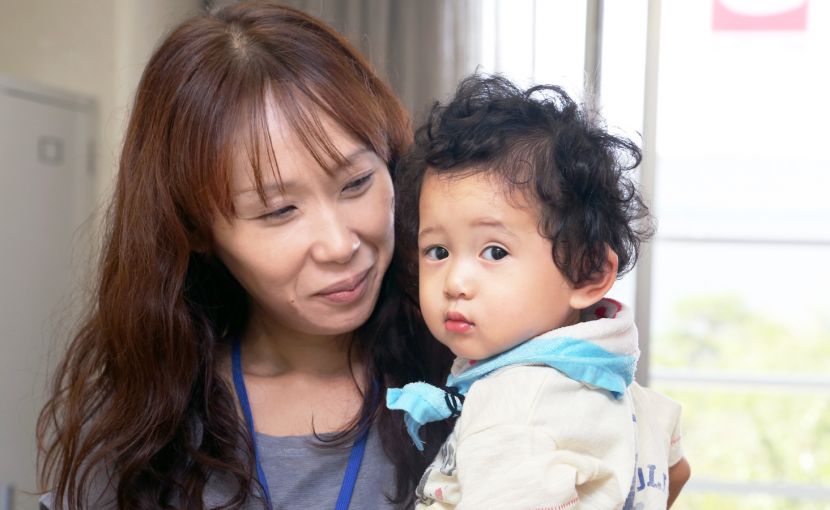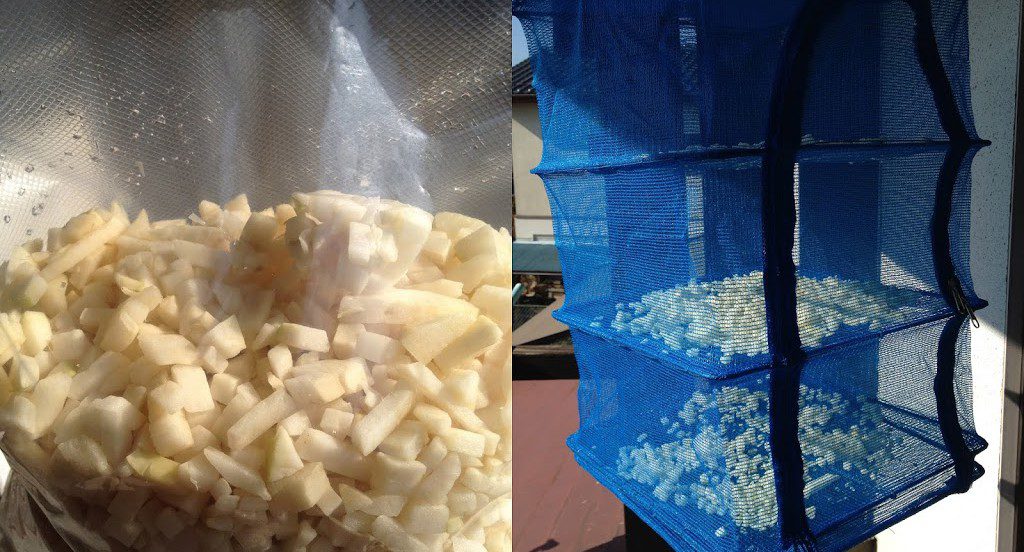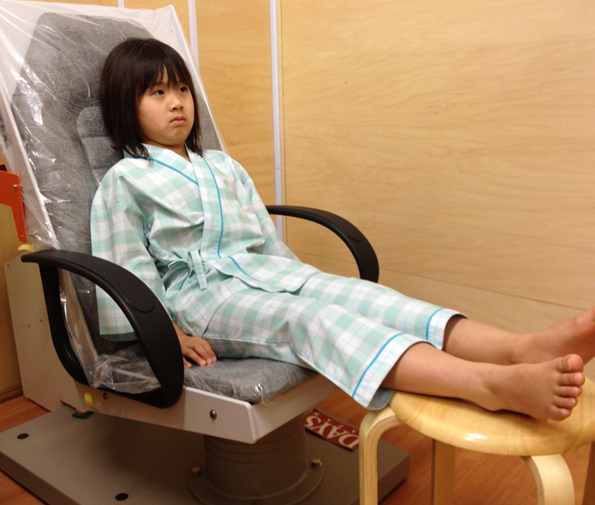Listen: Fukushima 30-Year Project
(conducted in April 2016)
A situation where you can’t “honestly speak” your thoughts and opinions
– Considering you are someone raised in Fukushima, with a mothers viewpoint and one who has continually been involved with the measuring of radiation, I’m sure that the interest from TV, newspaper and even overseas media has increased, wanting to hear your position. How do you feel about that?
Maki : In Fukushima, I think that there are very few people willing to speak about themselves. There are even fewer people trying to communicate their opinions to people outside the prefecture and overseas, so those who have read my interviews sometimes call me for more information. Even though this can be difficult, I feel it is vital to continue to convey the current situation in Fukushima, so I respond as much as I can.
– What do you think should be conveyed?
Maki : Fukushima is a difficult situation. The current flow of attention is focused mainly on just reconstruc-tion and dispelling harmful rumors however, there are many more problems.
For example, there is the matter of division (*01) among the citizens of Fukushima regarding money, health and living choices. I also think that the biggest problem is that the mothers in Fukushima are in a situation where they think they shouldn’t honestly speak their thoughts and opinions. I want to let them know that this isn’t true.
– Does that mean you think they should be able to discuss their problems and opinions?
Maki : That’s right.
– Besides those who think that everyone in Fukushima has recovered, and everything is safe, or want to believe it is safe, how many people are there whose voices are not being heard?
Maki : Most mothers say that people don’t talk about the issue anymore, but my gut feeling is that this is not the case. Everyone knows about the kind of work I do, so there are quite a few people who come to talk to me because they feel comfortable sharing their uncertainties. That is why I think there are many more people with these feelings. At the same time, it’s a bit different from not talking about the issue, but I think that there are people who don’t even have the issue in mind.
– I know it may be difficult to give numbers, but can you give us an estimate?
Maki : It’s probably more than 80 percent of the people who still feel somewhat uneasy. That is if you dig down deep and ask, as most of them don’t usually talk about such things. However, when we gather together for social activities and the topic comes up, many people share that they do have some anxiety. Also, whenever news of thyroid cancer (*02) or other new information is announced, those who thought everything was okay, often feel the uneasiness resurface as they feel again that Fukushima is still not in a safe situation. Therefore, I think there is a serious internal struggle where people try to convince themselves that everything is okay, which leads to uneasiness whenever something happens.
– On the other hand, do some people not want to talk to you because you are affiliated with transmitting information and the tracking of radiation measurements? I hear you are also subjected to criticism as much as you are counted on.
Maki : That doesn’t happen as often directly, but more on the Internet, where opinions come from those who are anonymous. Perhaps, those are people who see our activities and think that we are provoking anxiety in Fukushima. Certainly, those who wish to believe that Fukushima is safe may think we are just continuously creating more concerns and circulating that message to even outside the area. However, we think that it is important to know the truth about the current situation, and not just hope it is so.
– Can you give a clear example that shows Fukushima is still in an unsafe situation?
Maki : First, regarding threats to health, thyroid cancer is occurring more frequently than previously thought. In addition, some people believe that there are no more radioactive substances in the air, even though we have found opposite results in our experiments. There is a test that has been done called the Dried Daikon Radish Project (*03). A daikon radish was brought from Hyogo, a different prefecture, and measured to have zero Becquerel of radioactivity. Then, after being set outside to dry for a week, it was found to exceed 200 Becquerel. When you look at those results, you know that radiation is still present in the air.
– Even if there was no radiation in some places at certain times, it is right to assume that, at any time, there is bound to be some in the air depending on wind movements.
Maki : Yes, especially when the wind is strong. Cesium (*04) is smaller than pollen, and since we know yellow sand reaches Japan all the way from China, just imagine where cesium can go.
That’s why I still do not feel completely safe. I also think that the problem lies in the division between mothers, family members, and anyone who has made different choices regarding where to live.
Through continued measuring and living here, I do have hope for a brighter future.
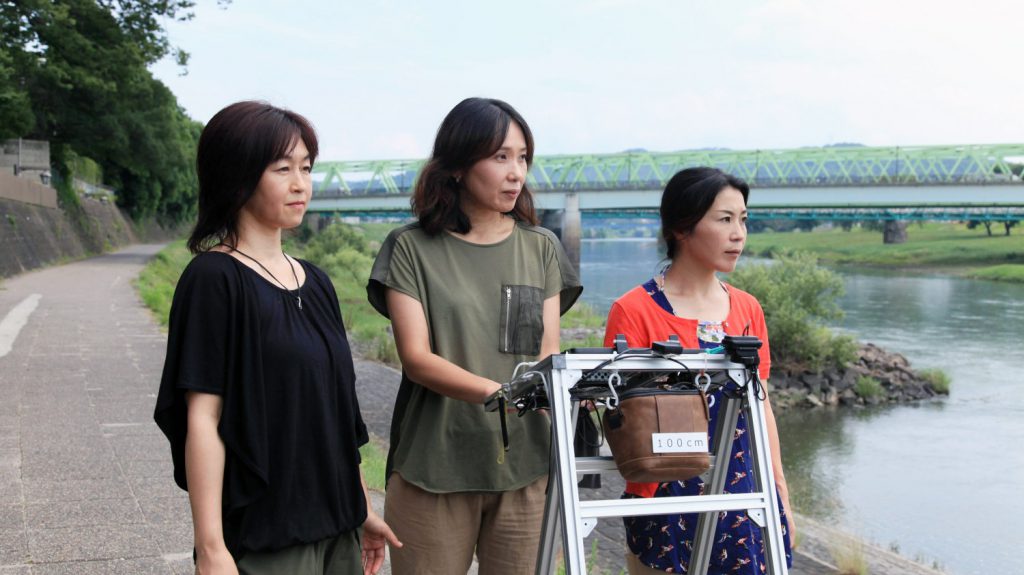
– Although there are various opinions regarding the matter, decontamination has been in progress, the atmospheric radiation rate has dropped considerably as the half-lives (*05) have passed, and the measured radioactivity rate in food has decreased. Having said that, it’s still hard to say all is well, when the machines used to check the Becquerel level has a minimum detection limit (*06) of roughly 20-30 Becquerel. Anything below that goes undetected and is declared zero. Mothers worry that radiation is still present in the air and that there are possibilities of internal exposure (*07) through inhalation when their children play outside. Among all these conditions, where is the biggest problem at present?
Maki : There is anxiety as far as the effects of low dose exposure (*08). We are unable to understand this problem if even the experts are divided regarding a threshold (*09). (Some experts believe if a minimum threshold is avoided there will be no effect in the body. Others however, believe that any exposure can lead to physical damage.) At the very least, we can tell you the facts that have been made clear, but I cannot say that everything is all right or that there isn’t a certain effect on the body. However, knowing the current situation, I think it is absolutely necessary to continue measuring the radiation in order to make decisions based on proper data.
For example, we have seen a considerable reduction of Cesium in Fukushima’s fruit through the hard work of the farmers keeping track of radiation levels. We know that for sure, as we have seen the graphs from the data.
– Is your biggest concern still about the children?
Maki : Yes, it is the health condition of children.
– There are experts measuring with Whole Body Counters (WBC) (*10) or Baby Scans (*11) in MinamiSoma City and claiming everything is alright. Also, the Prefectural Medical University claims that the examinations showing thyroid cancer are not related to the nuclear accident. Is there a difference between the measurements taken by the government and those taken by citizens, such as the Fukushima 30-Year Project?
Maki : When it comes to measuring with a WBC or thyroid examination, initially, there were so many being measured that there was a tendency to treat everyone as if they were in a factory line, rather than a careful examination, so I am a bit skeptical of the results. In addition, I think that it is strange that only the technical results come out. For example, they just say this case is A-2 (*12) or your child is B, and the parent has no idea where the problem is or what to do about it. Therefore, many people said they felt relieved to be able to participate together in a recent thyroid examination at the Tarachine (*13) room, where they can see the monitor together and are explained the results. Many people whose results were A-2 did not know what it meant.
– That is probably a problem that has continued since the initial period where levels were measured by inefficient dosimeters that were worn around the neck like lanyards (called “glass badges” in Japanese) (*14).
Maki : When there are so many citizens to measure it’s understandable that this problem will occur. I think it is our role to support areas where the government is still insufficient in.
– I think many people outside the prefecture and abroad are curious why people don’t leave the prefecture when they hear that things are still unsafe.
Maki : That certainly has been said ever since the earthquake. In my case, I had to stay due to a family’s health problem. That was my personal choice, but I now feel that living in Fukushima is alright if you are careful. I continue to measure every year and the longer I live here I am beginning to have some hope for a bright future.
– So even though you still feel anxious and uneasy, there is also a part of you that can see a bright future, yes?
Maki : Yes, I have both feelings. But even so, it comes in waves. I become anxious when I learn about depressing data, then I think that it will all be okay. I feel like I have been living on this wave forever. Nonetheless, there are still a lot of things that have really gotten better since the disaster, specifically the results of measured radiation levels in the atmosphere and in our food.
– Even if at minimal level there is now an organized measurement system in place.
Maki : Since I live in Fukushima, I am worried about the increasing cases of thyroid cancer although that is unpreventable. It is something dependent on the initial exposure to iodine (*15) immediately after the nuclear accident, so more than being concerned now, there is only regrets. The regret that we could have done more.
– Now, thinking about Fukushima as a whole, it seems that media coverage regarding these problems have decreased greatly.
Maki : There was a lot of news coverage and I got a lot of interviews when 5 full years had passed, but there was nothing to celebrate about. It’s just that 5 years had passed. Nothing had changed for our living environment and I felt that we will be forgotten again as well.
That is what I also thought at the time the decision was made to hold the Tokyo Olympic Games.That Fukushima will be forgotten about more and more.
Opinions of someone who is actually living and raising children in Fukushima.
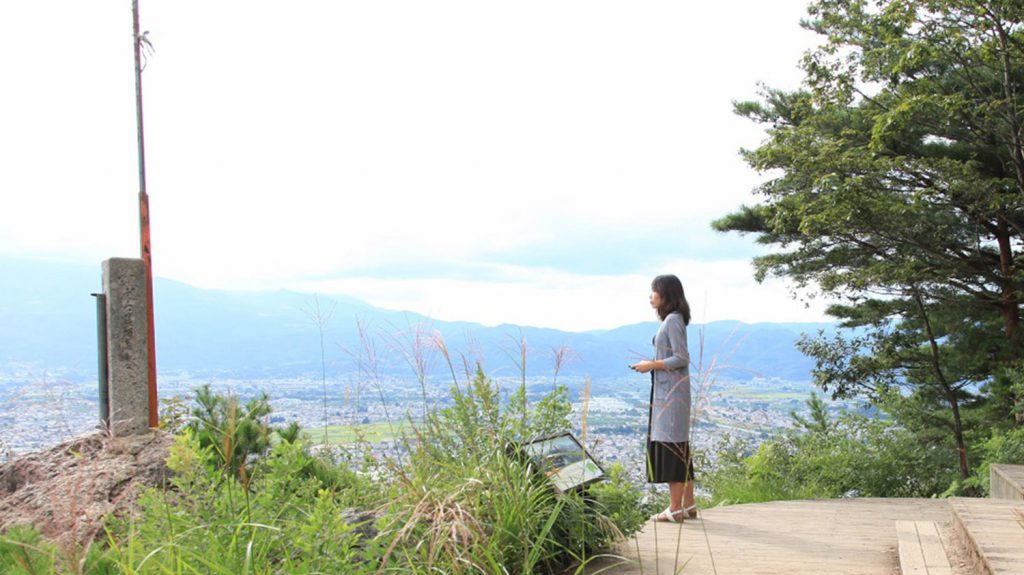
– Are the Olympic Games and Fukushima related?
Maki : In order to hold the Olympics and make it successful, it is obvious that they will try to hide problems even more than before. That is how Japanese society works, and even Fukushima itself wants the problems to be only based on false rumors. I think it is obvious that these two conditions will pursue- the action of hiding the problem without solving it.
Ideally, I hope the opinions of the people from the city and the prefecture can be communicated to the country, but there is not much hope for that. Both the city and the prefecture governments are of the same mind to continue progressing forward without speaking about any challenges or unsafe conditions.
– Conversely, is there anything in society that you find reliable or are grateful for?
Maki : In some of the interviews during the 5 year milestone, I felt that I was able to understand which side of the story they wanted to hear depending on the content the interview seemed to concentrate on. For example, a smaller newspaper called Tokyo Shimbun, which often provides sensitive and trustful reports regarding Fukushima issues, would report opinions of two scientists having different viewpoints on the situation in Fukushima then include my opinion as a resident who is experiencing complications directly. This was accepted favorably on-line as well. I’m glad that there were people who commented that it was very convincing to hear the opinion of someone who is actually living and raising children in the affected areas because that is something I wanted to convey.
Also, with the difficult situation in Fukushima not always easily conveyed outside the prefecture, there were some major women’s fashion magazine that covered the topic. This allowed people who were thinking that Fukushima is now okay to reconsider their thoughts. I appreciated how they reported the challenges regarding life in Fukushima and any uncertainty I felt without cutting things out. Recently, the media approaches me less and less as they do not want to broadcast information that is dangerous or uncomfortable. For those who do approach me, they want to hear reality as it is.
– Do you see any challenges or future prospects in the organizational management of Fukushima 30-Year Project?
Maki : As I said before, even the most knowledgeable of experts in the world cannot accurately grasp the influence of long-term, low-dose exposure to radiation at this point in time. If some unnamed diseases surfaces in our bones or muscles, similar to the symptoms of Bura Bura disease (*16), and there is not even any measurement data, then we will just be vulnerable victims. I do not want anyone in the world to experience such a situation again. That is why we will continue to measure radiation levels as much as possible and discuss with people holding different opinions. I want to continue supporting the creation of an environment that is easy to live in and without division between each citizen.
×Annotation *01 Division
There are many topics of division. First, regarding financial division, compensation given to families had been inconsistent and sometimes random. The official evacuation area was a radius of 20 km (12.4 mi), however, some people were allowed to evacuate and compensation was given if radiation was detected at the time and place measured. This lead to an imbalance in financial compensation given in an area. Other homes, even next door to homes deemed dangerous, were told to stay if they couldn’t detect a high enough level. For example, some homes may have had low levels in front of house and asked officials to measure in back of the house, where they knew levels were higher but were refused the right to evacuate and get compensation. This happened in evacuation spots such as Ryozenmachi, MinamiSoma city and others. This resulted in the disruption of local communities.
Regarding the influence of radiation on health, there are differences in thinking among family members as well as between married couples, such as whether or not to evacuate outside the evacuation area. This division has sometimes even lead to divorce. In addition, when a person who initially evacuated returns, they often feel guilt for ‘escaping’ when interacting with those who remained, making it difficult for them to return to the community.
×
×Annotation *02 Thyroid cancer
Thyroid examinations were given to children under 18 years of age at the time of the accident. The prefectural health surveys were conducted for the purpose of maintaining and promoting the health of Fukushima citizens that may suffer the influence of radioactive mate-rials due to the TEPCO Fukushima Daiichi Nuclear Power Plant accident. The result showed that 218 out of about 380,000 children had malignant cancer or potentially malignant cases as of March 31, 2019. The norm is found to be one or two per million children. When evaluating these surveys, the prefectural health investigation committee commented that “it is hard to think that these results are an effect of radiation.”
×
×Annotation *04 Cesium
Cesium 135, cesium 137, strontium 90, and cesium 134, from the ash generated from nuclear reactors, are representative products from fission of uranium. Among them, cesium 137 is generated in relatively large amounts and has a half-life of about 30 years. It can appear as radioactive cesium (radioactive isotope), as in ashes from nuclear weapons (black rain) and radioactive rain from nuclear accidents (radioactive fallout) with the residuals creating problems in the environment.
(From Wikipedia)
The Japanese government has made 100 Becquerel per kilogram the standard basis of radioactive cesium allowed in food. This sum pertains to cesium 137 and cesium 134.
×
×Annotation *05 Half-life
Half-life refers to the time it takes for a radioactive isotope to change to half of its nuclei from radioactive decay.
(From Wikipedia)
The half-life of cesium-137 is about 30 years, while the half-life of cesium-134 is relatively short and is about 2 years. As of September 2019, the ratio of cesium 137 and cesium 134 present in the environment is 1: 0.07 respectively.
×
×Annotation *06 Detection limit
The detection limit is the minimum detectable amount.
(From Wikipedia)
The machines used to detect radioactivity are intricate and unfortunately can only detect levels above 20 Becquerel. Therefore if levels are say 19, the result will show as zero, meaning not that there is no radiation but that the machine could not detect any in the conditions given (volume, measurement time, etc.). If the measurement time is extended or the volume is increased, the detection limit could be increased. For example the detection limit of 20 Becquerel per kilogram could be detected by extending the measurement time.
×
×Annotation *07 Internal exposure
Internal exposure occurs when the human body is exposed to radiation. Protection methods differ depending on if the radiation exposure is internal or external. There is fear of internal radiation exposure when radiation enters the body through radioactive substances in the air. Once radioactive substances enter the body, there is no way of removal but to wait for the radioactive decay or natural release through metabolic biological functions.
(From Wikipedia)
×
×Annotation *08 Low dose exposure
Refers to the minimum amount of absorption of radiation by the body before physical or biological problems occur. The low dose radiation exposure level is approximately 100 to 200 millisieverts (mSv). In Japan, there was a major social problem in the 1950’s when a hydrogen explosion on a ship (named Number 5 Fukuryu-maru) triggered low dose exposure from the radioactive dust. (From Wikipedia)
×
×Annotation *09 Threshold
Derived from the hypothesis, called the Linear no-threshold model (LNT model), that the probability of cancer, leukemia, or other conditions cannot easily be statistically verified if developing from low dose expo-sure to radiation. The LNT model was adopted in 1977 by the International Commission on Radiological Protection (ICRP), recommendation No. 26, as the most rational model for managing radiation to protect human health. In this recommendation, any amount of exposure is considered dangerous and can be physically damaging even if it is lower than the recommended safe level of 100 mSv or the amount is too low to be detected by inefficient mechanisms. In other words, radiation is always considered harmful with no safety threshold, and the sum of several very small exposures are considered to have the same effect as one large exposure.
(From Wikipedia)
Also, the exposure should produce a net benefit, as in the example of exposure from X-rays. It is recommended useful to compare the merit of taking an X-ray and the disadvantage of exposure.
×
×Annotation *11 Baby Scan
The WBC named FASTSCAN, which is in standard use in Fukushima prefecture, was developed to measure nuclear operators (adult male) and not infants or small children. A WBC dedicated to measuring infants named the Baby Scan was developed to solve this problem. The examination is done while the infant or child is distracted by watching a game or video on an iPad.
BBC News – Japan earthquake: Fukushima radiation scans for babies https://t.co/APGmojXHbq
— Fukushima 30-Year Project (@30_fukushima) September 9, 2019
×Annotation *12 A-2
The results of thyroid examinations conducted by the prefectural health department are reported in four levels; A-1, A-2, B and C.
A-1-A state where the presence of both cysts and nodules was not recognized.
A-2-A cyst 20 mm or less in size, or a nodule of 5 mm or less has been recognized.
B-A cyst larger than 20.1 mm, or a nodule larger than 5.1 mm has been recognized. Further examination is recommended.
C-It is recommended to carry out further examination immediately.
Surgery is recommended by the Fukushima Prefectural Medical University if judgment of B or C is made and cysts or nodules are suspected to be malignant and needing surgery after the secondary examination (cytological examination).
×
×Annotation *13 Tarachine (old term meaning nursing mother)
Began in November, 2011, in the city of Iwaki in Fukushima. A non-profit established Radioactive Citizens Measurement Room called Tarachine. Measurements are taken of food, environmental radioactivity, WBC measuring, Beta ray measuring, and thyroid testing.
English name
Mothers’ Radiation Lab Fukushima
×
×Annotation *14 Glass badge
A small glass dosimeter that can hang around the neck for personal use. This is a kind of dosimeter that uses special glass material that emits light when radiation is detected. It is possible to measure accumulated radiation dose received by an individual.
(From Weblio dictionary)
It was originally developed under the assumption that the source of radiation would come in one direction (the front) as when in an X – ray room. Since TEPCO’s nuclear accident at the Fukushima Daiichi nuclear power plant created countless sources of radiation in the environment, these devices are unable to provide accurate measurements.
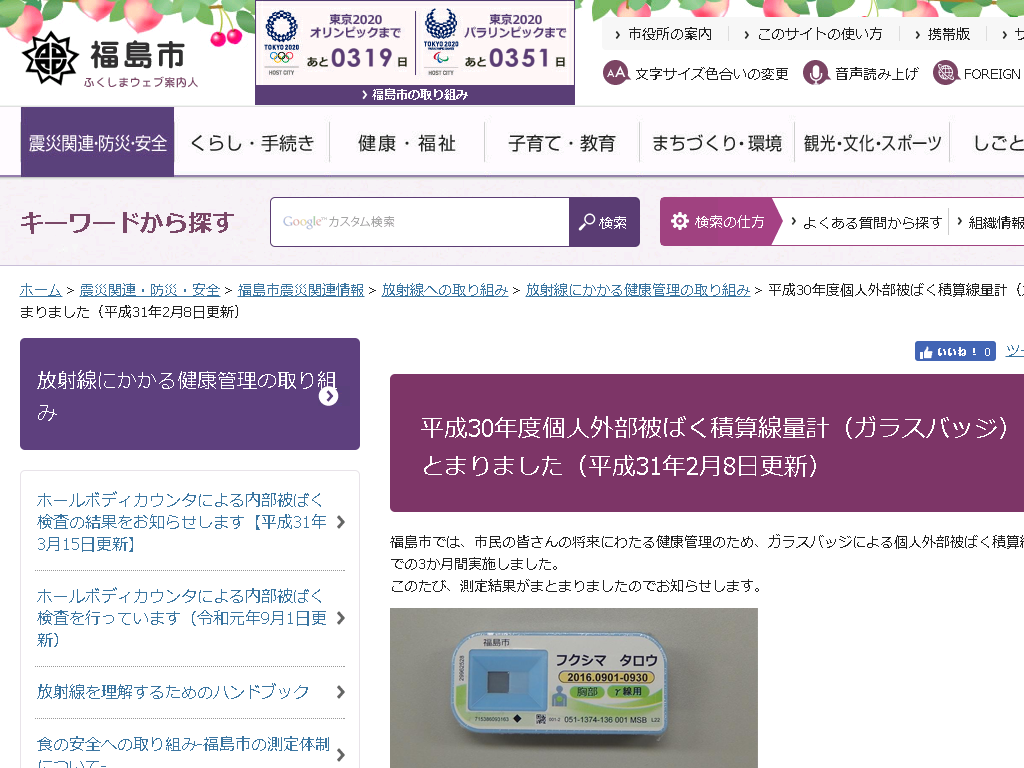
×Annotation *15 Iodine
Iodine 131 refers to one of the radioactive isotopes of iodine with a mass number of 131. The half-life is about 8 days. It is one of the three major nuclides that causes thyroid cancer from radioactive contamination.
(From Wikipedia)
Iodine 131 gathers in the thyroid glands of the throat when inhaled and can cause thyroid cancer. In the Chernobyl incident, the case of thyroid cancer in children, which was normally found in one to two children out of a million, increased rapidly, making the influence of radiation exposure to be officially recognized. The thyroid examination for individuals under 18 at the time of the Fukushima accident was modeled after the experience from the Chernobyl accident.
×
×Annotation *16 Bura Bura disease
The atomic Bura Bura disease is one of the physical effects resulting from an atomic or nuclear explosion. The symptoms, often seen in nuclear survivors, are that physical strength and immunity becomes weak, unexplained fatigue, sluggishness and more. There are high rates among the victims of being unable to work in the same way as others, getting sick more often, and being more susceptible to serious diseases.
The disease was named by citizens that experienced the bombing in Hiroshima, and a physician named Shuntaro Hida conducted clinical studies based on the experience of the exposed patients. According to Hida, many patients of the Bura Bura disease, as it was often called at the time, had persisting symptoms, were diagnosed that there was no abnormality anywhere even after undergoing various tests under a doctor, and confessed to have many painful memories of being labeled a lazy person from friends or family.
(From Wikipedia)
×

